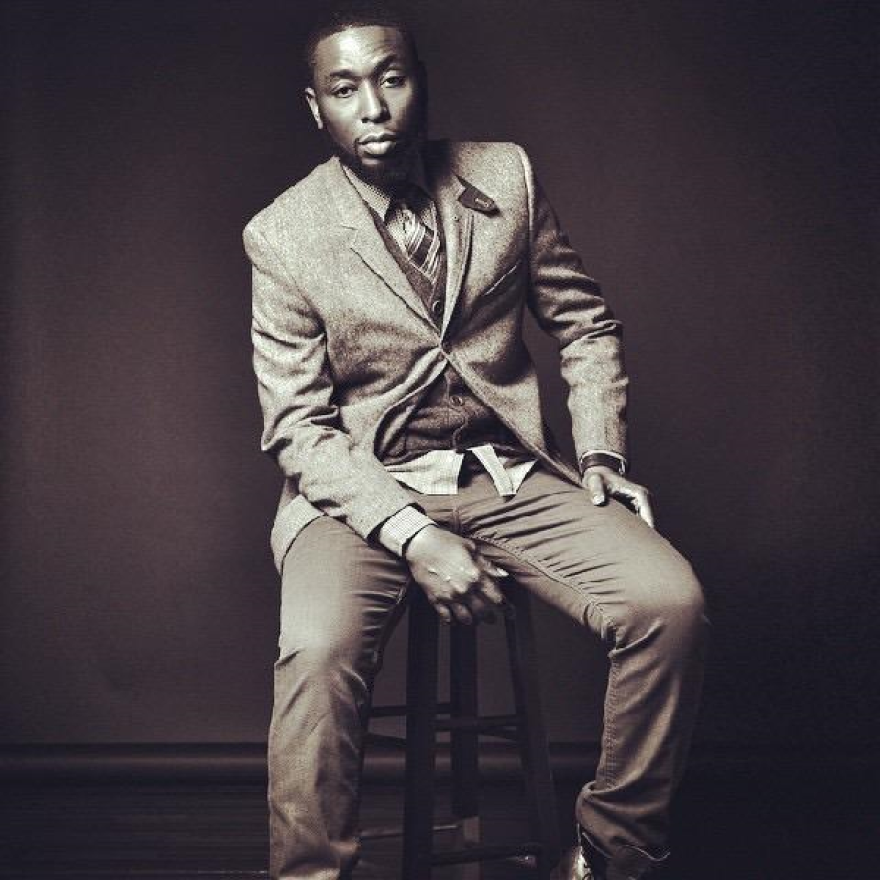Patrick Douthit has been making music as hip-hop producer 9th Wonder for nearly two decades. In the early 2000s Douthit gained recognition for his work with the North Carolina hip-hop group Little Brother. He went on to produce music for Jay-Z’s 2003 release “The Black Album” and Destiny’s Child’s 2004 album “Destiny Fulfilled.” He won a Grammy for his work on Mary J. Blige’s 2005 album “The Breakthrough.” Douthit grew up in Winston-Salem and remembers hearing his first hip-hop song in 1982 with Afrika Bambaataa’s “Planet Rock.”
Throughout the next few years, Douthit soaked up the sounds of hip-hop and grew in his own musical skills. He played the clarinet in the school band during middle and high school. Today Douthit consistently collaborates with top names in the industry. Earlier this year, he produced for rapper Kendrick Lamar’s highly-anticipated album “DAMN.”
Douthit is also the founder of the independent record label Jamla Records, an artist-in-residence at North Carolina Central University and an adjunct professor at Duke University in Durham.
The Soundtrack Of 9th Wonder’s Life
“Easy” by The Commodores
My parents were in a choir, so I grew up in the church and gospel music – spirituals as we called them. But then my brother introduced me to funk and soul. He was in high school in the late ‘70s and ‘80s. A lot of his junior high music was Parliament Funkadelic and The Commodores. “Easy” by The Commodores had a certain feeling to it. Gospel music already has a feeling to it, but this was something. It had a different groove to it than gospel music did. [My brother] listened to The Commodores and listened to Parliament. He listened to Boston, Night Ranger. He listened to a lot of different groups from that time.
“Planet Rock” by AfrikaBambaataa
Even though the beat machines that Toto and other groups were using – they were being used in hip-hop, because Roger Linn, the guy who created what we know now as the MPC, also revolutionized the drum machine. So a lot of these particular sounds were used in British pop rock and hip-hop at the same time. Early on I was more in love with what was going on in the background as opposed to what the lead was doing. Certain drum sounds, certain feels, certain chord changes… I didn’t know to call it a chord change at the time. I just knew when we got to the chorus in “Africa” by Toto it felt a certain way to me as opposed to other things in music.
“Rebel Without a Pause” by Public Enemy
Hip-hop was something that we partied to and had fun to, but then Public Enemy taught me something outside of just how to say a rhyme...How can you apply the rhyme to everyday life? That’s how Public Enemy spoke to me. “Rebel Without A Pause” made me challenge my teachers in a different way. Chuck D and I are good friends. The first thing I said when I met him was, “You were the first black history teacher I ever had.” This was 7th grade, and now I am challenging the idea of who discovered America. Who invented what? Why are we only talking about six black people? Why aren’t we talking about a myriad of black people that have done great things for this country?
“Speed” by Little Brother
We wanted to do something different because we were influenced by things we heard on the Internet, as well as early ‘90s stuff, the Tribe’s and the De La’s, groups like that. But now there is a group called Black Star with MosDef and Kweli, and there was a producer by the name of Dilla, Madlib and Hi-Tek. We wanted to come from that cloth. Much to a lot of people’s chagrin in the area that we lived in, that was going against the grain. We were told it would never work and that nobody would want to hear that. But when you say “nobody” most people say that speaking of people in your circumference, not necessarily globally or nationwide. So we decided to strike out on our own and find out on our own pockets. We weren’t concerned about who didn’t want to listen. We were concerned about the people who did. The internet was the new means to be able to do that.
https://www.youtube.com/watch?v=n1e1wEGGQFg
“Threat” by JAY Z
JAY Z became for us who searched for music on the internet and we were the so-called “underground kids” or “backpack kids” – JAY Z was the antithesis of all that. He talked about women, popping bottles and jewelry, and we were like, “No, no, no.” So now here I am in the studio with the guy who I thought was against the culture in my young frame of mind. Once I got in the studio with him we started talking about music, and the one thing that struck me was that he didn’t ask me to change my music. There’s this whole thing in the music industry where they ask you to change who you are. This guy didn’t ask me to change who I was. He wanted me exactly how I was. I was like, “Wow, maybe I am missing something. Maybe I’m missing the idea of who is in power, who is ruling the culture and who is saving it.” Now I am confused, because this is not the narrative that I came up with on my own. We did a song called “Threat,” and for me being the “backpack kid” and the “underground kid,” it’s the most merciless and bloody song on that album.
“DUCKWORTH” by Kendrick Lamar
Kendrick was a kid I met in 2010. He tweeted me, and I missed the tweet. I had just gotten on Twitter, and I wasn’t too familiar with it. This is before he put out “Section.80”... He tweeted me and said, “Man, I just want to bless one of your beats.” It’s 2010, and what I didn’t understand about Kendrick, Drake, Big Sean, Big K.R.I.T., Mac Miller and all these people, while Little Brother was doing our thing around the globe and the Internet, we were raising an entire generation of kids that was seeking us out on the net. Just like we were making fans, we were making artists, and we didn’t even know it. Kendrick was one of those kids. I end up meeting him the next day still not knowing that he tweeted me, and he was like, “Man, I just want to do something.” Time passed on, and I put on a song with a group on my album… So we got to Kendrick after “To Pimp a Butterfly.” We get to “DUCKWORTH,” and he took three of my beats from a pool of 15 and took three of those and made a song about how his dad and how his label boss had an encounter and it could have went bad but it didn’t and now he is here. It’s the last song on his album, and it was incredible.



